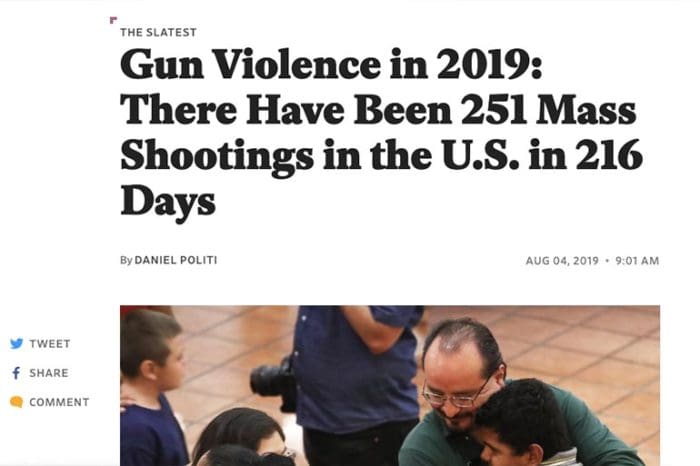This is TTAG’s weekly roundup of legal and legislative news affecting guns, the gun business and gun owners’ rights.
Apologies for the late roundup this week. What was rounding up to be a very uneventful week in the firearm world when we were shaken by a series of back-to-back mass murders. Over the past several days, we’ve seen a very interesting rhetoric suggesting that there have been 250 “mass shootings” in the United States this year. This might shock you. You might even find it unbelievable. That’s because it is unbelievable.
The gun control crowd capitalizing upon a catastrophe is nothing new. Neither is intentionally misleading people with undefined or vaguely defined terms like “mass shooting.”
Anyone who sincerely believes there have been 250 mass shootings, as we understand them, in the United States in just over half a year must be living in a horrifying parallel reality.
This number is pulled from the “gun violence archive,” an anti-gun organization that aggregates certain data. The problem is that the site is very “black box,” making it difficult to understand how and why it classifies certain incidents.
That said, it seems the majority of incidents the site calls “mass shootings” involve no deaths and several injuries. Remember, also, that “injuries” does not necessarily mean gunshots.
It appears that, under the GVA model, if a gun goes off in a parking lot, and four people trip and fall, the incident qualifies in their book. This obviously isn’t the type of thing anyone considers a “mass shooting.”
The only curative measure we can have here is to accept a definition of “mass shooting.” I believe the Mother Jones definition fairly encapsulates the concern.
Gilroy Shooting Exposes Opponents of Federalism
Last week, a mass killing at a Californian festival put California, as ever, in the public spotlight. The killer employed a WASR-10, an inexpensive Romanian-sourced AKM derivative (many will misreport the WASR as an AK-47 derivative, despite its post-modernization stamped receiver).
That said, it doesn’t take a rocket theologist to see the problem: AKMs are verboten in California. So, clearly, the fact that an AKM-derivative made it into the state of California means we need to re-think our entire system of government. Or so the gun control reactionaries suggest, searching for a way to absolve California of any possible maladministration in the wake of the murders.
The response is about as devoid of nuance as one might expect. Of course California couldn’t protect their residents from “assault weapons,” because other jurisdictions exist! How is California expected to rid the world of particular firearms when Nevada dares to wield its sovereignty in an incompatible manner?!
This type of reporting, focusing on the fact that states have different laws, is difficult to construe as anything less than a full-on recantation of federalism. But in reality, the concept of a border having a significant effect on policy-making decisions cuts both ways in the political cloth. The real question is whether, in a particular instance, you want the federal government to impose a floor or a ceiling.
In the abortion context, progressives clamor for a federally imposed floor for abortion rights, while demanding a ceiling for gun rights, with “law and order” conservatives operating in the inverse. We can see that, in both instances, it is “federalism for me and not for thee.”
The reality is that, if we are going to operate in a system of interconnected jurisdictions and governmental powers, borders have to mean something. If both North and South Carolina have lawmaking authority, the fact that one bans something that the other doesn’t is not a flaw of the federalist system.
Arguing that it is, though, is nothing more or less than an attempted referendum on the federalization of any policy.
Florida Appeals Gun Law Supremacy Suit
Last week we covered Florida’s supremacy problem, where a group of local governments banded together to sue the state over a law that imposed penalties for violating the state’s supremacy law, and passing local gun laws stricter than state law. The Circuit Court sided with the local governments, who wanted to violate the law without the added stress of fines, something they may have in common with their constituencies who have ever been extorted or held at gunpoint after driving 7-over in a fake construction zone.
Florida’s AG is appealing the decision, but in a move that couldn’t possibly be political, the Agriculture Commissioner (whatever that is), the lone Democrat in the state cabinet, is urging the Attorney General to drop the appeal. As for why, Commissioner Nikki Fried made vague, circular allusions to having fulfilled her “legal obligation as a defendant,” and, to complete the ritual, talismanically invoked the influence of the NRA. Or something.
The profound irony of this situation would almost escape you, given the clearly principled, not at all hackish lauding of the Circuit Judge’s ruling. All you have to do to “snap out of it” is remember that this isn’t a question of changing the law. Everyone knows that, in Florida, gun control is out of local hands. This lawsuit is entirely about whether or not the local governments can skirt the penalties for violating state law.
At the same time, the Coral Gables mayor announced that he is already planning on violating state law to restrict the rights of his constituents, now that he knows he won’t be among those harmed by ill-informed alarmist expansions of the criminal law.
Cuomo Signs Bump Stock Ban and High-Capacity Waiting Period
Gun policy mastermind Andrew Cuomo just finished marinating in self-regard after signing into law two new gun controls. One is a bump stock ban, the utility of which is dubious even without the ATF’s illegal reclassification of the devices, seems especially strange.
Is this a tacit acknowledgement of the impropriety of the ATF’s ban? Or is it just more empty political grandstanding? Both? Who knows.
